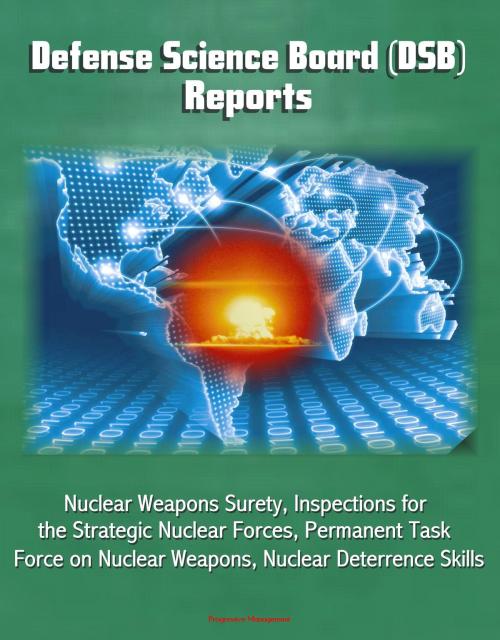Defense Science Board (DSB) Reports: Nuclear Weapons Surety, Inspections for the Strategic Nuclear Forces, Permanent Task Force on Nuclear Weapons, Nuclear Deterrence Skills
Nonfiction, History, Military, Nuclear Warfare| Author: | Progressive Management | ISBN: | 9781301014835 |
| Publisher: | Progressive Management | Publication: | September 25, 2012 |
| Imprint: | Smashwords Edition | Language: | English |
| Author: | Progressive Management |
| ISBN: | 9781301014835 |
| Publisher: | Progressive Management |
| Publication: | September 25, 2012 |
| Imprint: | Smashwords Edition |
| Language: | English |
Three reports by the Defense Science Board (DSB) provide unique information about America's nuclear weapons program.
Part 1: Report of the Defense Science Board Permanent Task Force on Nuclear Weapons Surety On Nuclear Weapons Inspections for the Strategic Nuclear Forces - This task force was asked by the Deputy Assistant to the Secretary of Defense for Nuclear Matters (DATSD/NM) to evaluate the effectiveness of nuclear surety inspection procedures and processes, to include assessments of Service surety and readiness inspections and of Defense Nuclear Surety Inspections conducted by the Defense Threat Reduction Agency (DTRA). This review is especially critical at a time of increased focus on the safety, security, and reliability of our nuclear forces. The task force members assessed the processes and procedures of Service and DTRA programs, to include specific guidance, directives, and instructions. The task force members have set forth recommendations in the areas of the adequacy of guidance for nuclear operations and inspections, inspection team qualifications, and relationships between different categories of nuclear inspections.
Part 2: The Defense Science Board Permanent Task Force on Nuclear Weapons Surety - Report on the Unauthorized Movement of Nuclear Weapons - Task Force report on an independent assessment of the systemic causes of the August 30 unauthorized movement of nuclear warheads from Minot AFB, North Dakota to Barksdale AFB, Louisiana. Based on the information and insights gained from investigating and assessing these systemic causes, the report includes 16 recommendations to strengthen nuclear weapons surety.
Part 3: Report of the Defense Science Board Task Force on Nuclear Deterrence Skills - As requested in the Terms of Reference the Task Force was asked to assess all aspects of nuclear deterrent skills (military, federal, and contractor.) Specifically, utilize the 2000 Nuclear Posture Review and the Strategic Capabilities Assessment to frame the operation of: a) nuclear project management, b) nuclear safety and security, c) weapons effects, simulators, EMP and survivability, d) design and logistics, e) C2, nuclear operations (crew training) and execution, f) planning and g) nuclear policy; assess the progress of the Department of Energy since the publication of the Chiles Commission report; and recommend methods and strategies to maintain a right-sized U.S nuclear deterrent through 2020. The final report provides findings and recommendations addressing broader programmatic issues stemming from a lack of prioritization and de-emphasis of nuclear related systems. The senior leadership must become more involved in developing and sustaining the role of nuclear forces in the 21st Century. Once defined and agreed upon, it can then be used to strategically manage nuclear competencies (design, industry, assessment skills) and capabilities.
Three reports by the Defense Science Board (DSB) provide unique information about America's nuclear weapons program.
Part 1: Report of the Defense Science Board Permanent Task Force on Nuclear Weapons Surety On Nuclear Weapons Inspections for the Strategic Nuclear Forces - This task force was asked by the Deputy Assistant to the Secretary of Defense for Nuclear Matters (DATSD/NM) to evaluate the effectiveness of nuclear surety inspection procedures and processes, to include assessments of Service surety and readiness inspections and of Defense Nuclear Surety Inspections conducted by the Defense Threat Reduction Agency (DTRA). This review is especially critical at a time of increased focus on the safety, security, and reliability of our nuclear forces. The task force members assessed the processes and procedures of Service and DTRA programs, to include specific guidance, directives, and instructions. The task force members have set forth recommendations in the areas of the adequacy of guidance for nuclear operations and inspections, inspection team qualifications, and relationships between different categories of nuclear inspections.
Part 2: The Defense Science Board Permanent Task Force on Nuclear Weapons Surety - Report on the Unauthorized Movement of Nuclear Weapons - Task Force report on an independent assessment of the systemic causes of the August 30 unauthorized movement of nuclear warheads from Minot AFB, North Dakota to Barksdale AFB, Louisiana. Based on the information and insights gained from investigating and assessing these systemic causes, the report includes 16 recommendations to strengthen nuclear weapons surety.
Part 3: Report of the Defense Science Board Task Force on Nuclear Deterrence Skills - As requested in the Terms of Reference the Task Force was asked to assess all aspects of nuclear deterrent skills (military, federal, and contractor.) Specifically, utilize the 2000 Nuclear Posture Review and the Strategic Capabilities Assessment to frame the operation of: a) nuclear project management, b) nuclear safety and security, c) weapons effects, simulators, EMP and survivability, d) design and logistics, e) C2, nuclear operations (crew training) and execution, f) planning and g) nuclear policy; assess the progress of the Department of Energy since the publication of the Chiles Commission report; and recommend methods and strategies to maintain a right-sized U.S nuclear deterrent through 2020. The final report provides findings and recommendations addressing broader programmatic issues stemming from a lack of prioritization and de-emphasis of nuclear related systems. The senior leadership must become more involved in developing and sustaining the role of nuclear forces in the 21st Century. Once defined and agreed upon, it can then be used to strategically manage nuclear competencies (design, industry, assessment skills) and capabilities.















